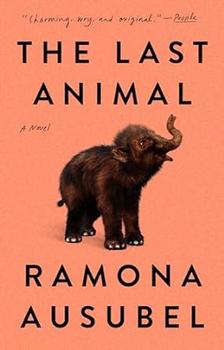Summary | Excerpt | Reading Guide | Reviews | Beyond the Book | Readalikes | Genres & Themes | Author Bio

A Novel
by Ramona Ausubel
Dmitri swatted and he said, "You should have seen it a few weeks ago. May is worst. Lucky for you to be here in June."
There was a long sunset in the middle of the night and everything else was noon, and their bodies were so upside-downed that they rested like dogs-someone was always asleep, briefly, then hungry and disoriented. In the dawn or dusk of a day that never ended or began they pulled to a spot on the side of the river where there were two huge posts, and finally, finally tied off.
There was a small wooden dock onto which Aleksei tied the boat. He stood with arms out to help the passengers down. Vera looked out at grass and brush, at the dark wet earth. She could see some small cabins down a path of mud and in the distance were pine trees. It looked like the African savanna crossed with a high meadow. She could hear the river water against the bank and from somewhere, wind or ocean—she was not sure which. Watching the people disembark was a herd of something very big, great hairy bodies and horns. The animals were chewing grass. Todd said, "Compatriots," and saluted. When Vera stepped out, the ground was spongy and dark. There was a gassy smell, the long-ago seeping out of the earth. Eve and Vera took their own bags this time because Dmitri and Aleksei had boxes of food: coffee, powdered creamer, potatoes, onions, loaves of bread, a gallon of cooking oil, a cooler of moose and a single apple balanced on top.
At home in Berkeley everyone was gluten-free or vegan or lactose-intolerant or avoided nightshades. Even the teenagers ordered cold-pressed green juice instead of coffee (or they ordered coffee but it was single-origin and fair-trade and the cup arrived with a perfect leaf in the organic, grass-fed foam). Dmitri did not ask if there were food sensitivities in the group. These were the available foods and the human bodies required their sustenance.
The large hairy creatures stared at the bald humans. Dmitri said, "Within the park where we have animals grazing the ground is flatter but you should still follow paths. Outside the park you will sink into mud immediately and get stuck. That way is the sea, everywhere else is more and more of Siberia. The size of this land is incomprehensible which is why we need all the animals to help take care of it. You have met musk oxen, we have also bison and wild horses. Grazers to save the world." One animal hoofed at the ground, eyes on Vera, who reached a hand toward her big sister. The thing was ancient and matted and seemed made-up, like a great blanket with legs. Creatures belonged to this place; humans were the obvious intruders.
"Fortunately," Eve said to Vera, "the beasts were vegetarians."
Vera knotted Eve's fingers in her own. "Unfortunately, they used their massive horns to defend themselves."
Eve said, "I've always suspected that our parents accepted the probability that we would die in the field. Fortunately, you won't be the victim of a mall shooting, but unfortunately, your mother's work has now taken you to the land of the angry yak."
Jane appeared out of nowhere and said, "That's not a yak, it's a muskox. You'll be fine."
"Dad always told us a nervous vegetarian is more deadly than a hungry carnivore."
Vera was quiet but a blue pool sat at the bottom of her belly. Her father battered at her. This life of movement and travel and research had been his idea first and he had given it to Jane like a virus and Eve and Vera were born infected. They had grown up on the road, on the move, in countries all over the world. They had been brave, or else they had had no choice. Both felt true, in alternating moments. The summer Vera was nine and Eve eleven their family had been evacuated from Somalia when a civil war had broken out. It was four years ago but Vera remembered perfectly being driven in a bulletproof car through the deserted streets to a grass runway where a small propeller plane waited. It was only them and another white family. Their dad had said, "Life is not easy. You don't get great art without war. You don't get progress without cost. You don't get beauty without suffering." Only, the person who died wasn't the one who suffered, Vera now thought. He had been driving too fast on an Italian road but she was the one who had to live with the crash for the rest of her life. A crash that felt like it was always happening somewhere in her own mind. Vera had always wanted to be a good helper and now she bent toward tasks as a matter of survival. Heartbreak paved over with a list of to-dos.
Excerpted from The Last Animal by Ramona Ausubel. Copyright © 2023 by Ramona Ausubel. All rights reserved. No part of this excerpt may be reproduced or reprinted without permission in writing from the publisher.
Your guide toexceptional books
BookBrowse seeks out and recommends the best in contemporary fiction and nonfiction—books that not only engage and entertain but also deepen our understanding of ourselves and the world around us.